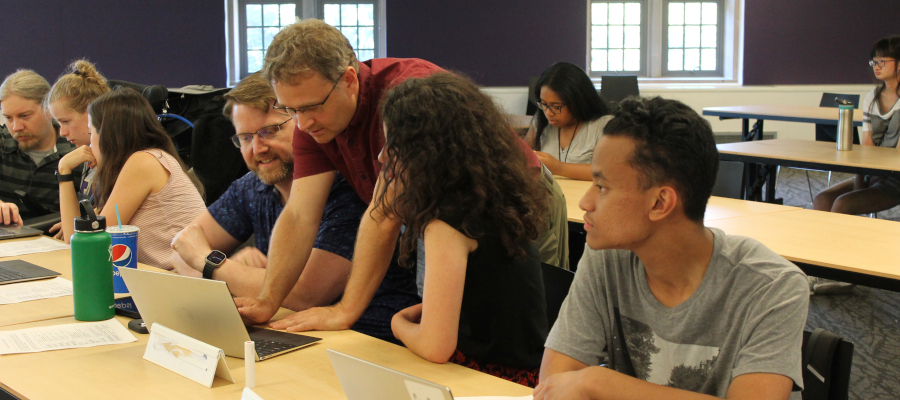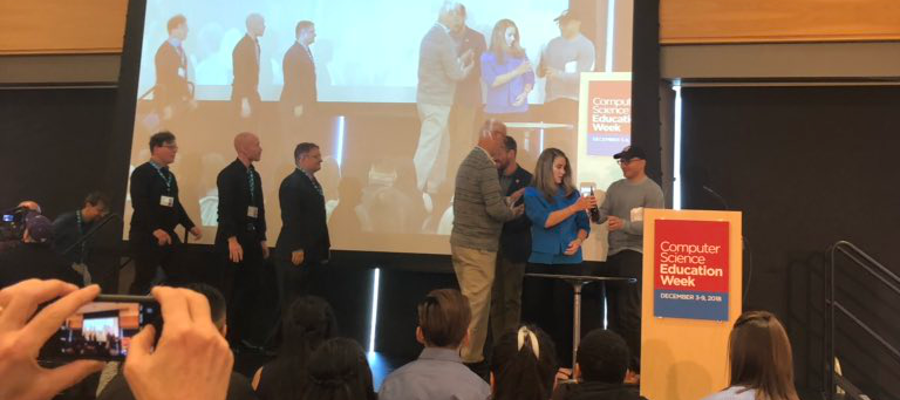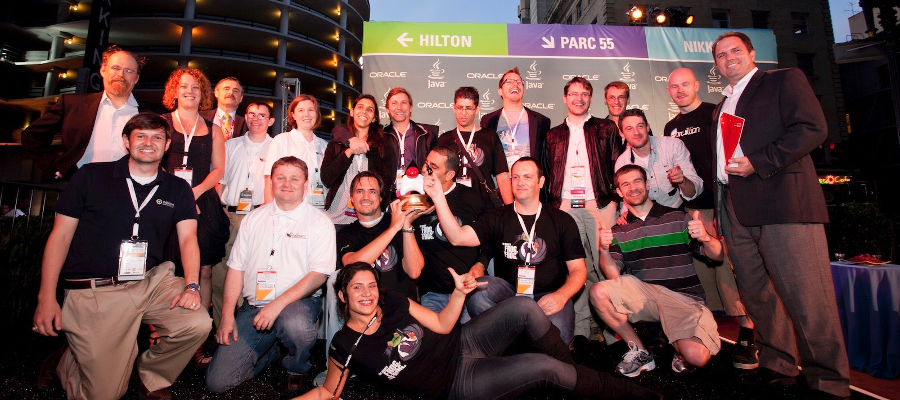
Andreas Stefik, Ph.D.
Professor
Computer Science
University of Nevada, Las Vegas
2016 White House Champion of Change
Curriculum Vitae

Professor
Computer Science
University of Nevada, Las Vegas
2016 White House Champion of Change
Curriculum Vitae
On this page, I describe awards and grants for my work. The three largest awards I have won awards are from Oracle Corporation (2011), the U.S. White House under president Barack Obama (2016) for my work on the Quorum programming language, and Code.org, presented by Melinda Gates as a lifetime achievement award. I have also won eight major grants from the National Science Foundation. Details of these awards and grants follow. The NSF has funded my work for more than $10 million over the years.

This award, highlighted during cs ed week, was given for work helping those with disabilities enter computer science.While I feel incredibly uncomfortable being called a hero, you can read more at the heroes for computer science website.

This award, given by Code.org and the Computer Science Teacher's Association (CSTA) was given for work on making computer science more accessible to people with disabilities. It was presented by Melinda gates.
As part of my work, I was honored in 2016 as a White House Champion of Change. This is a video created by Amy Poehler's smart girls for the event. This event was part of the push in the united states toward Computer Science For All. You can read more about this here:

This is an award provided by Oracle Corporation for a tool I developed called Sodbeans. This tool was an early attempt to make development environments more accessible.
Google 2024
This is work to assist those use or develop for Blockly in regard to accessibility.
We are creating accessibility training materials and holding professional development events to help developers understand this complicated space.
NSF RPP: 2048356 2024
Supplement for Collaborative Research: Creating and testing data science learning tools for secondary students with disabilities
This is a supplement to an ITEST award related to accessible data science at the high school level.
NSF RPP: 2121993 2021
PI: Medium RPP, High School Strand: Collaborative Research: AccessCSforAll: Making High School Computer Science Accessible
This is the third major grant to the Access CS For All team making computer science more accessible to people with disabilities. It is a collaborative grant between the University of Washington and the University of Nevada, Las Vegas. In this version, we are creating an online accessible block editor for high-school and working with pre-service and in-service programs for computer science.
Link to AccessCSForAll PageNSF HCC: 2106392 2021
PI: Collaborative Research: Investigating Inclusive Data Science Tools to Overcome Statistics Anxiety
The purpose of this grant is to create an open-source online data science utility and to investigate the challenges in doing data science online for all people, including those with disabilities. Many people experience anxiety in statistics or data science and our hope is to reduce this through reasonable and inclusive interface design that is accessible to all. This is a collaborative grant with St. Louis University and the University of Maine.
NSF I-TEST: 2048356 2021
PI: Collaborative Research: Creating and testing data science learning tools for secondary students with disabilities
This grant is designed to investigate and create open source offline data science learning tools for secondary students. Statistics has traditionally been esoteric and the goal with this work is to try and make it more intuitive, in addition to making it accessible to students with disabilities at the high-school level. This is a collaborative grant with St. Louis University and the University of Maine.
NSF STEM + C: 1738259 2017
PI: Collaborative Research: AccessCSforAll: Including Students with Disabilities in at the High School Computer Science
This is the second major grant to the Access CS For All team making computer science more accessible to people with disabilities. It is a collaborative grant between the University of Washington and the University of Nevada, Las Vegas. In this second grant, we focused on making the College Board's AP Computer Science Principles course accessible to students with disabilities. As part of it, we investigated how the course is designed, collaborated with code.org to develop alternative versions of the course, and worked with teachers in the blind, deaf, and learning disabilities communities. All content was made open source.
Link to AccessCSForAll PageNSF ECR/EHR-CORE: 1644491 2016
CO-PI: Perceptual and Implementation Strategies for Knowledge Acquisition of Digital Tactile Graphics for Blind and Visually Impaired Students
In this grant, we explored math and data analysis through the use of tactile displays, especially vibration capabilities and its limitations. Ultimately, we found that we can use laser doppler vibrometers to very accurately measure the capabilities of vibration systems, which we applied to generate guidelines for how vibration can be used in touch based systems.
NSF STEM + C: 1640131 2016
CO-PI: Research Supporting Multisensory Engagement by Blind, Visually Impaired, and Sighted Students to Advance Integrated Learning of Astronomy and Computer Science
In the IDATA grant, we explored how to integrate computer science content and astronomy to make it accessible to specifically blind or visually impaired students using robotic telescopes. We found there remains significant barriers to astronomy for people that lack vision, but that many of these barriers are solvable. Students need better ways to code astronomy content accessibly and better ways to do accessible graphics online. This grant also led to the open-source website for the Quorum programming language and much of its online content.
NSF CE21: 1440878 2014
PI: Collaborative Research: CS 10K: AccessCS10K: Including Students with Disabilities in Computing Education for the Twenty-First Century
This was the first major grant to the Access CS For All team making computer science more accessible to people with disabilities. It was a collaborative grant between the University of Washington and the University of Nevada, Las Vegas. In this version, we focused on creating accessible content for Exploring Computer Science, in addition to working with partners to explore what needs to be done across the field to make computer science more accessible. It was a pre-cursor in the sense that it gave us time to figure out what needs to be accessible and possible approaches for getting there.
Link to AccessCSForAll PageNSF BPC 0940521: 2010
PI: Broadening Participation in Computing NSF CNS-0940521. Collaborative Research: BPC-DP: Building an Educational Infrastructure for Students at K-12 Schools for the Blind to Broaden Participation in Computing
The purpose of this grant was to create the Quorum programming language and to start a national infrastructure for blind or visually impaired students to participate in computer science. As part of it, I completed the following activities: 1) created and implemented the Quorum programming language, 2) started the national infrastructure I proposed, and 3) wrote a variety of publications on aspects of the project, which ultimately led to the awards I am winning today. The work started in this grant has persisted long past the initial funding, for more than a decade.
Link to Quorum PageThe National Science Foundation regularly issues Research Experience for Undergraduate grants (REU) to our lab for students to collaborate with us. This has funded many such small supplements for students. Other small grants have paid for various projects.